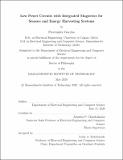Low power circuits with integrated magnetics for sensors and energy harvesting systems
Author(s)
Garcha, Preetinder(Preetinder Kaur)
Download1191624846-MIT.pdf (38.25Mb)
Other Contributors
Massachusetts Institute of Technology. Department of Electrical Engineering and Computer Science.
Advisor
Anantha P. Chandrakasan.
Terms of use
Metadata
Show full item recordAbstract
The continued expansion of Internet of Things has led to a proliferation of wireless sensors and systems across the globe. The application space for sensors is wide-ranging: from industries, to serve the upcoming era of Industry 4.0, to consumer products, like body wearable sensors. The rise to billions of sensors relies on two key trends in sensor systems: miniaturization and energy-efficiency. This work explores the use of integrated magnetics in microelectronics to enable low power, energy-efficient sensing, as well as energy harvesting to power the sensors, in a compact form factor. For industrial applications, we present the design of a bandwidth-scalable, integrated fluxgate magnetic-to-digital converter for energy-efficient contactless current sensing in smart connectors. The system uses mixed signal front-end design to en-able duty cycling and quick convergence techniques leading to 20x reduction in power consumption at low bandwidths of 1 kHz for power monitoring. It also employs fast read-out circuits to achieve a bandwidth of 125 kHz for machine health diagnosis. For personal body wearable electronics and beyond, we present the design of a cold start system with integrated magnetics for ultra low voltage startup in thermal energy harvesting applications. The Meissner Oscillator analysis with on-chip magnetics allows co-optimization of magnetics and circuits to achieve start up from as low as 25 mV input voltage to the circuits, despite 1000x lower inductance than off-chip transformers. Given the recent push towards artificial intelligence and a growing need for data, along with sensors to collect that data, we need to explore novel uses of technologies to meet the demands for small form factor and low power operation, as the number of sensors scale. The ideas presented in this thesis, with two very different applications of the integrated magnetics technology, can contribute to the continued growth towards trillions of sensors.
Description
Thesis: Ph. D., Massachusetts Institute of Technology, Department of Electrical Engineering and Computer Science, May, 2020 Cataloged from the official PDF of thesis. Includes bibliographical references (pages 145-151).
Date issued
2020Department
Massachusetts Institute of Technology. Department of Electrical Engineering and Computer SciencePublisher
Massachusetts Institute of Technology
Keywords
Electrical Engineering and Computer Science.